We Chose Tung Oil For Butcher Block And Love It!
Kitchen countertops take a beating! When it comes to sealing your butcher block countertops you don’t want to settle for any run-of-the-mill sealer. Trust us – we’ve tried! When it comes to sealing, Tung Oil for butcher block is your best bet!
After two years of heavy use, our countertops finished with 100% Pure Tung Oil from RMP Finishes (formerly Real Milk Paint Co.) still look AMAZING! Here’s what you need to know.
A case for butcher block countertops
Somehow in our decade plus of marriage we’ve owned 4 different homes and done 3 pretty involved kitchen remodels.
Plus, all of them were done on a very tight budget. You can read more about our cost saving tips in our post – How to Create Your Dream Kitchen Remodel on a Budget | 5 DIY Ideas to Save Thousands.
If there’s one thing we’re sold for life on, it’s butcher block countertops. Here’s just a few reasons why:
They’re inexpensive. You can buy standard lengths of raw butcher block from most major hardware stores at very affordable costs as compared to even the most entry level countertops, like laminate.
They’re DIY friendly. You don’t need to be a pro to install them. With just a circular saw and some other basic tools you can easily install your own butcher block countertops.

They’re forgiving. Yes, butcher block is not impenetrable like other countertop options. But with just a light sanding and reapplying your finish, they can always look brand new!
They’re natural. When it comes to food prep you want a toxic-free surface. Many countertops are industrially produced from plastic that continually gives off toxic fumes. Even stone options often require a toxic sealer or conditioner to be applied regularly to the surface. What’s more natural than wood?
They’re beautiful! Butcher block countertops provide a warm and friendly feel in any space. They can be modern, quaint, or rustic. And they just stand out! They’ve been the perfect compliment to our farmhouse kitchen.
But we’ve definitely learned a thing or two about how to finish them.
How NOT to seal your butcher block countertops
After excitedly installing butcher block countertops in our first kitchen remodel we soon realized we overlooked one important detail; how to seal them?
So we hopped over to our local hardware store and checked out the options. We found a bottle of butcher block sealer made with a blend of beeswax and mineral oil. It sounded natural enough so we went with it!
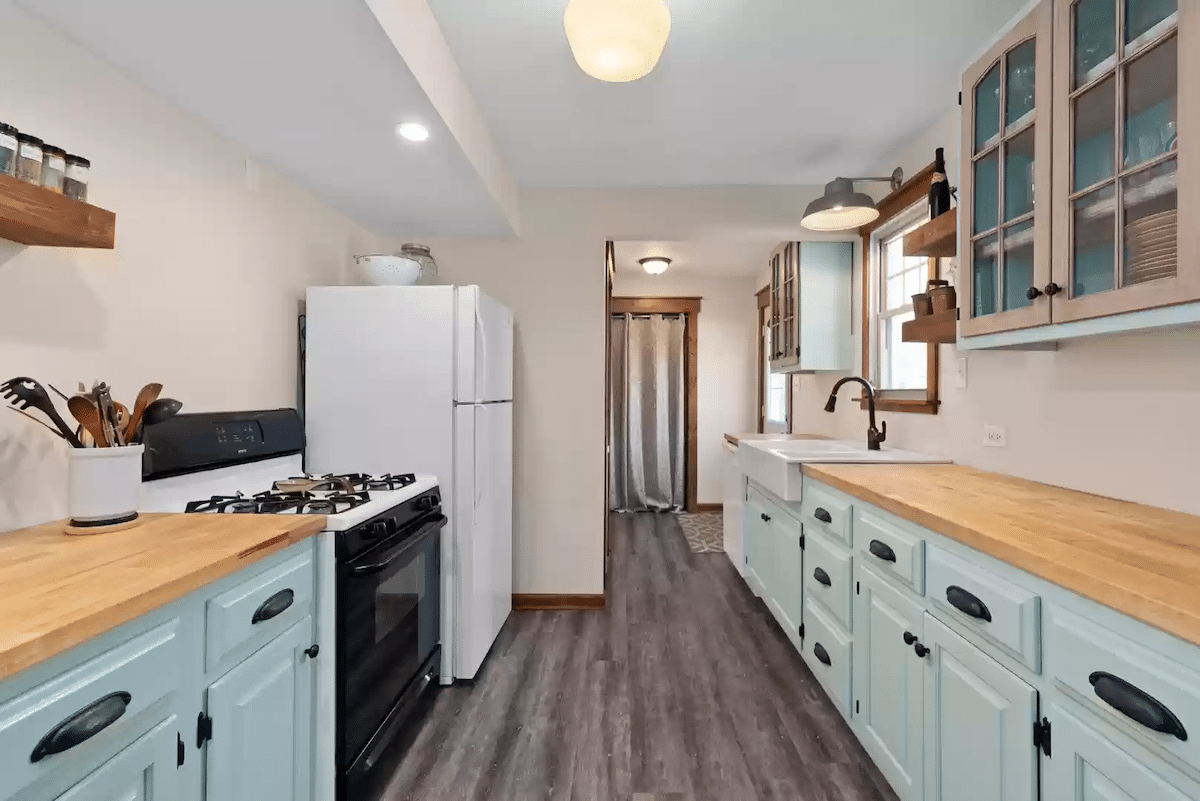
It was easy to apply – looked great – and even smelled great. But after a couple months of routine kitchen use, we were feeling uneasy about what we got ourselves into.
What, another ring from leaving a water glass out on the counter overnight?
We learned quickly that leaving a drying towel down for any amount of time when doing dishes was just a bad idea.
And I’ll never forget the day I came home after a mishap with some beets and a blender and realized I’d be staring at those purple spots for a long time.
The kitchen is not the place to be on pins and needles about making a mess. We sold that house but resolved that should we ever have butcher block countertops again we would do a bit more research.
What is the Best Tung Oil? – Why we choose Real Milk Paint Co.
A year or so later I decided to make Joelle a cutting board out of one of the cutoff butcher block pieces we still had from that kitchen remodel.
And that cutting board would get some daily use and abuse! Time to research a more impenetrable finish option.
Polyurethane? Nope. Yes, it would make them waterproof. But coating natural wood in plastic just didn’t seem right. And refinishing them would be a nightmare. Why even have butcher block then?
There were plenty of oil options out there for a sealer. Each with its own set of pros and cons. But one repeatedly stood out: Tung Oil.
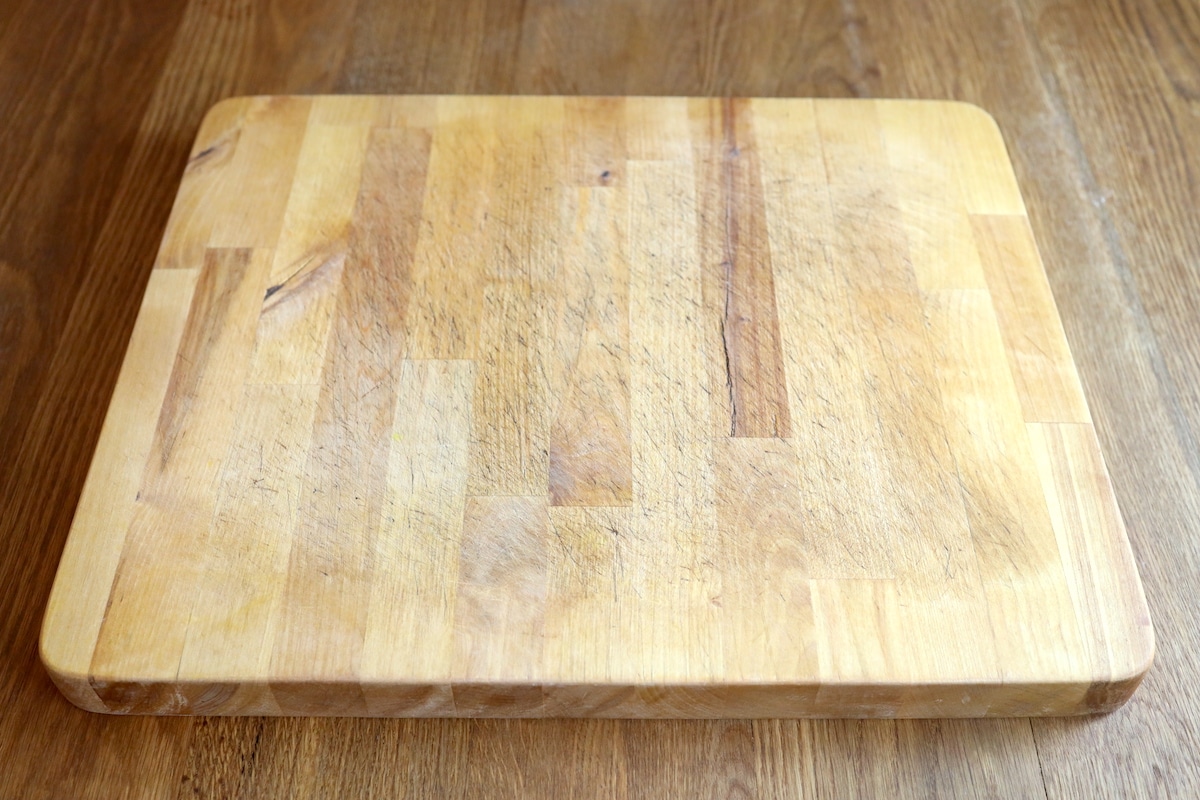
We had previously been introduced to RMP Finishes through their milk paints. We loved the transparency and commitment to quality, natural products this small business offered. And their 100% Pure Tung Oil finish for butcher block really caught our attention.
So, I ordered up a bottle, sealed the cutting board, and loved the end result. Four years later that same cutting board is still looking beautiful and holding up incredibly well!
Lo and behold, a little over two years ago we bought our foreclosed, 5-acre homestead property that once again needed a complete kitchen overhaul. Did we go with butcher block countertops? You bet!
And this time, sealing them with Tung Oil from Real Milk Paint Co. was a no-brainer!
What is Tung Oil and how is it used?
Tung oil (or Chinawood Oil) is 100% natural and made by crushing the seeds from the nuts of tung trees. It has been used for centuries, often nautically as a dependable waterproofer for boats and ships. More recently the uses of tung oil have expanded to the home. Particularly on surfaces that come in contact with food because of its non-toxic nature.
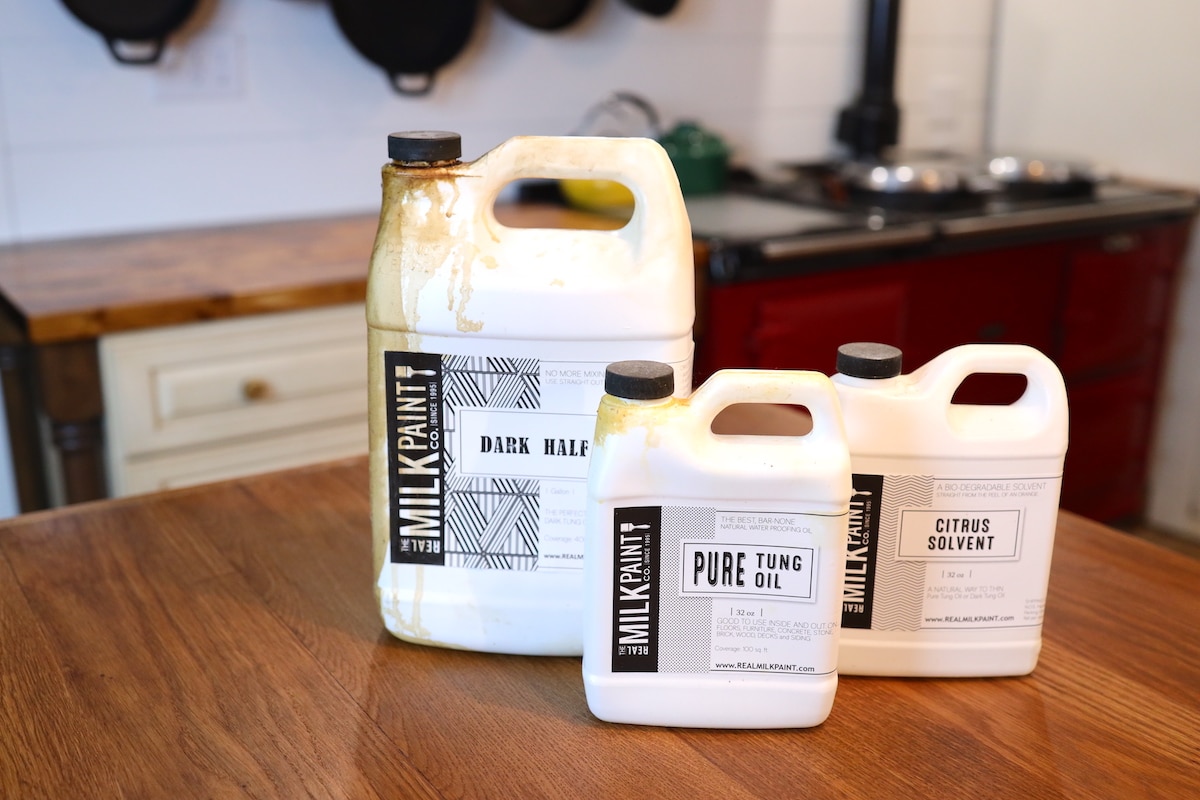
Tung Oil is thick and needs to be thinned for deep penetration. To thin, it’s commonly paired with a Citrus Solvent. Citrus Solvent is also a natural, food-safe product derived from orange peels. Plus, you can’t beat the aroma it leaves! Mineral spirits are another option to thin Tung Oil with, but are less natural being derived from petroleum.
Mixing Tung Oil and Citrus Solvent at a 1:1 ratio allows for a deep and penetrating finish on your wood. Real Milk Paint Co. sells a pre-mixed blend called Half & Half, which is a 50/50 blend of Tung Oil and Citrus Solvent.
A more affordable Half & Half option using Pine Solvent is also now available.
The seal Tung Oil provides is hard and waterproof, yet flexible and easily allows for refinishing. Tung Oil gives a clear, matte finish to wood that does not yellow wood to the extreme of other oil finishes like linseed oil.
Real Milk Paint Co. also offers a Dark Tung Oil that provides a beautiful and rich dark wood color. Many stains contain toxic ingredients, but the natural resin used to stain wood in Dark Tung Oil holds true to the company’s commitment of a truly natural product. You can also purchase Dark Half, which is the dark version of their 50/50 Half & Half blend. This is what we used for our countertops!
Benefits of 100% Pure Tung Oil for Butcher Block
Food Safe
Real Milk Paint Co. guarantees their Tung Oil to be 100% pure. No additives, preservatives, or petroleum derived ingredients. There are only two things; oil from the tung tree and citrus solvent from orange peels. It doesn’t get more simple than that! And this matters when it comes to the surfaces your food will come in contact with.
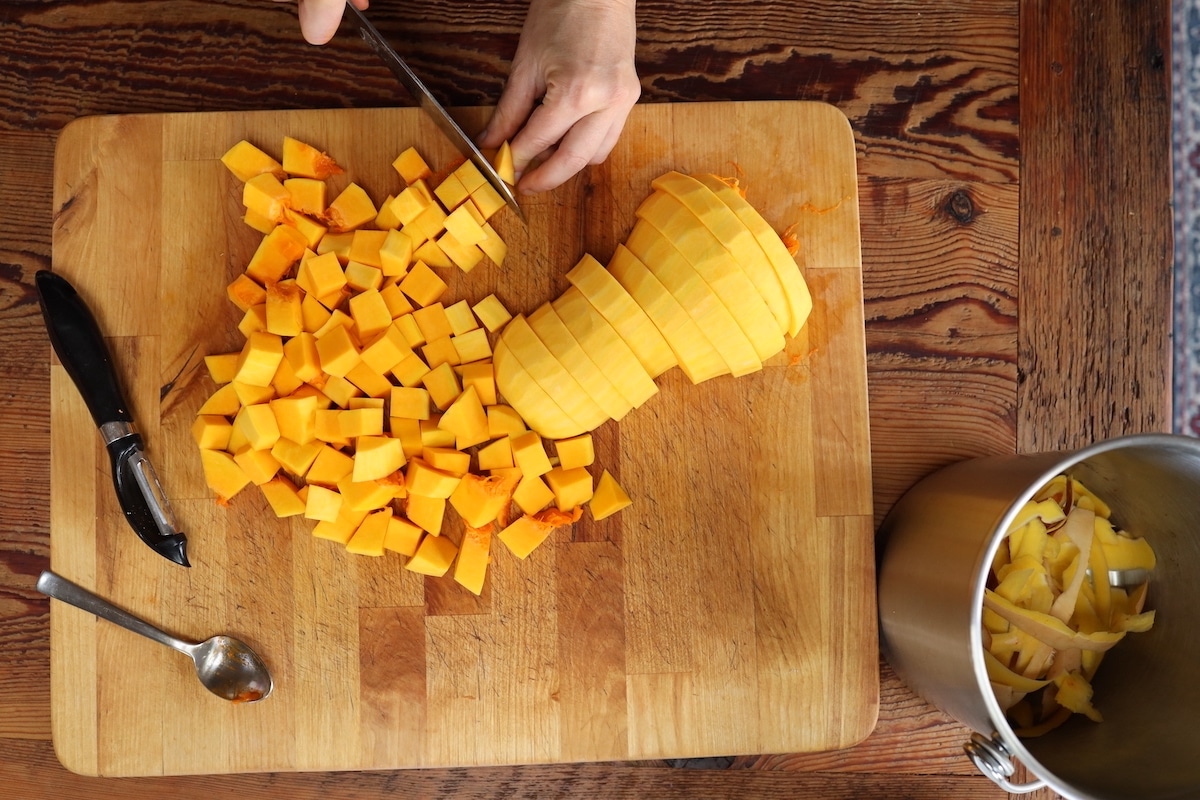
Waterproof
There are few, if any marks on our countertops from liquids after a couple of years of heavy use. Water literally pools on top like it would on granite. We do try to be conscious and wipe up wet spots when we see them. But we don’t have to live in constant fear that one slip-up or forgotten water glass will produce an everlasting ring. And we even have our butcher block around our sink!
Easy To Apply
Seriously, you don’t have to be any sort of woodworker pro to produce a stunning end result! The application process is as simple and forgiving as it comes. You can really WOW your guests when you let them know you finished your own countertops!
Non-toxic
Tung Oil has zero VOC’s (volatile organic compounds) and is safe to contact the skin during and after application. Just like in the food industry, you have to do your homework and read labels these days as to what’s inside building materials and products. As a former construction manager, one of my main reasons for leaving the industry was how cheap and toxic many standard materials have become. Stains and sealers are often atop of that list.
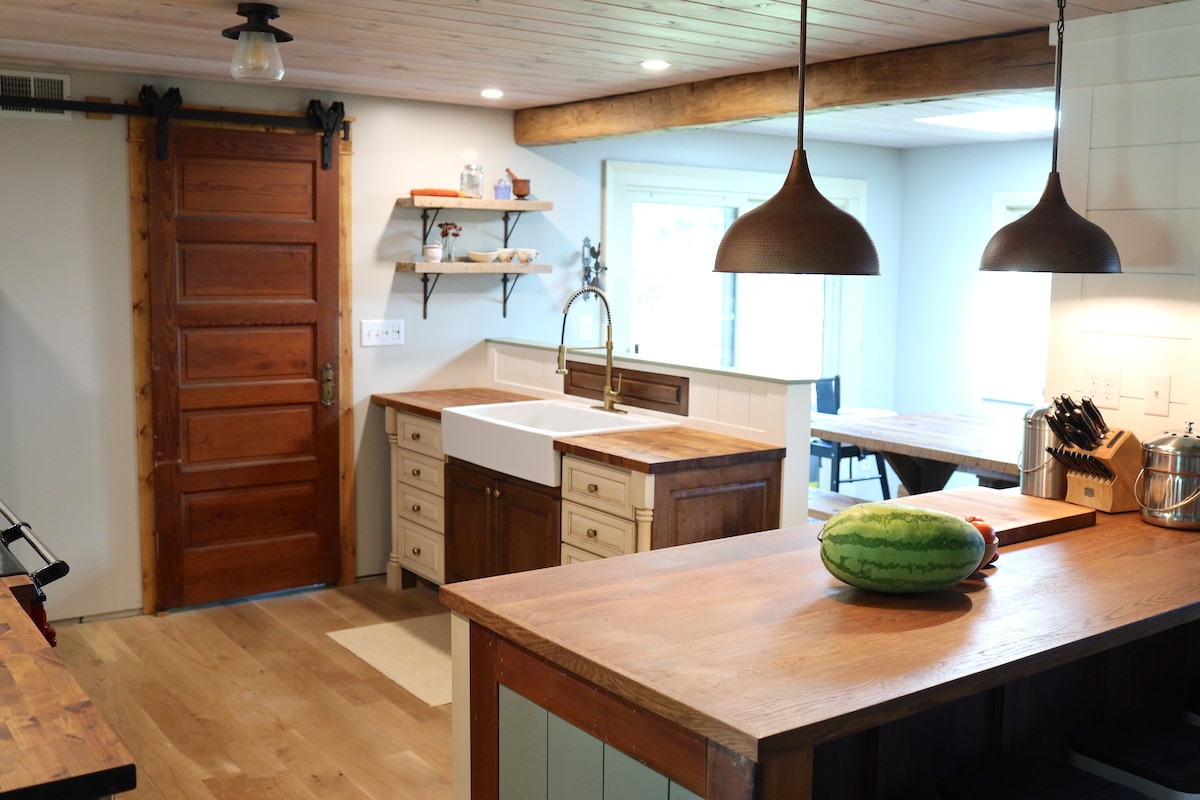
Gorgeous
Tung Oil does an amazing job of preserving the natural beauty within the wood. Many oil sealers continue to darken or yellow wood over time. Tung Oil only provides a slight coloration that holds true over time. The Dark Tung Oil applies evenly and leaves deep, stunning wood tones.
Disadvantages of Tung Oil for Butcher Block
Every oil will have its disadvantages. Our experience with Tung Oil has been so positive though that it seems like a bit of a stretch to come up with any cons. However, here’s a couple of things to consider.
Curing Time
Tung Oil can take up to 30 days to fully cure. This can easily be remedied by setting up temporary kitchen prep surfaces for a time while curing. Honestly though, we started using our countertops pretty quickly after we first finished them and they still help up shockingly well. The curing time is a minor disadvantage but it’s worth mentioning so you can plan for lighter use during that period.
Maintenance
When going with butcher block, regardless of sealer selection, maintenance comes with the territory. Tung Oil is no different. The “set it and forget it” option doesn’t exist. All butcher block sealers need to be reapplied occasionally. The good news is that reapplying Tung Oil to keep them looking new is really simple, which we’ll talk more about.
How to finish butcher block countertops and cutting boards with Tung Oil
I will always recommend you check out the manufacturer recommendations when it comes to application. Real Milk Paint Co. has a helpful butcher block tutorial post.
But here are the simple steps we followed when applying Tung Oil to our butcher block countertops:
Step 1: Prep Surfaces
Assuming you are starting with raw butcher block, provide a light sanding first to remove any bumps or imperfections. Start with 80-100 grit sandpaper for larger flaws, then finish with 120-150 grit sandpaper. It’s important to not finish finer than 150 grit as the oils will not be able to penetrate as deeply. Wiping the surface with a moist rag will raise the grain allowing for a smoother finish when sanding. Wipe away any dust or debris when satisfied with the surface.
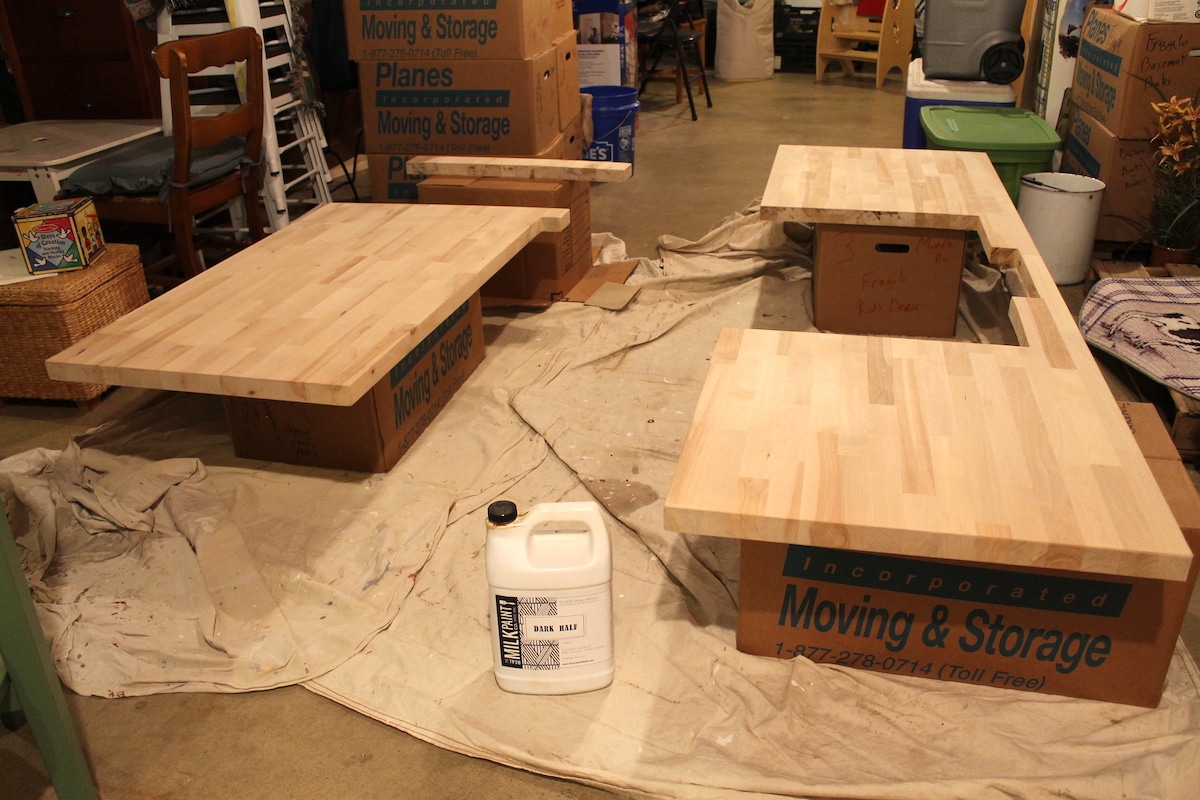
Step 2: Mix
Unless you’ve bought the half Tung Oil, half Citrus Solvent mixture you’ll want to mix them to a 1:1 ratio. We typically just used something that can be disposed of after like an old yogurt or ice cream container. And if using Dark Tung Oil or Dark Half, don’t forget to thoroughly stir the oil before pouring so the pigment applies consistently.
Step 3: Apply
You’ll want your first coat of Tung Oil to be heavy. Raw wood soaks up oils rapidly. Pour the oil directly onto surface and work it into the wood grains with a rag, sponge, or brush. We usually used an old t-shirt or sock. Continue to apply coats allowing at least 30 minutes for absorptions between each coat. Be sure to apply coats of Tung Oil around the edges of the countertop along with at least 2 thick coats on the bottom side for an even finish and protection. Once wood appears fully saturated and to no longer be absorbing oil, move on to the next step.

Step 4: Wipe Away
Let the final layer of Tung Oil sit for at least 30 minutes, then wipe any excess away with a fresh, clean rag. Wipe smoothly with the grain to leave a uniform finish.
Step 5: Cure
Tung Oil will take 15-30 days to fully cure. Use your countertop surfaces minimally during this period. Especially for the first 10 days following application. Some residual oil may continue to rise to the surface and can be wiped away. I’ll be honest that we didn’t follow the curing procedure to a T, but still have been very happy with the look and longevity of our countertops!
Refinishing butcher block countertops with Tung Oil
The beauty of butcher block is that they can always be new again! A quick refinish (and sanding if necessary) and any flaws can instantly vanish.
But when do you refinish them? That’s really up to you and how much wear and tear you’re ok with. You might have something more catastrophic happen – a gouge or gash, spill or stain. Or you might just have minor scuffs and marks that add up over time.
We didn’t refinish ours until after two years of heavy use. Really they still looked great, but we were happy to lightly sand out any minor imperfections, reapply some fresh Tung Oil, and be setup again for at least a couple more years.
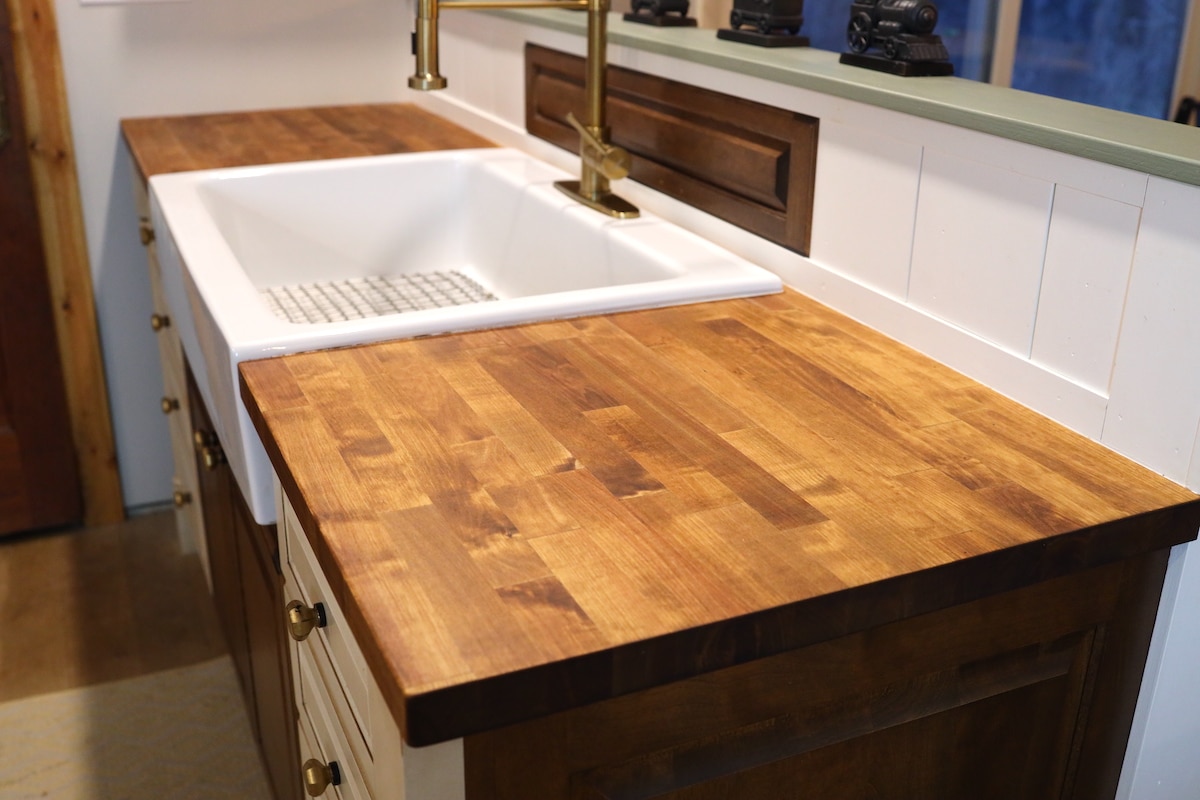
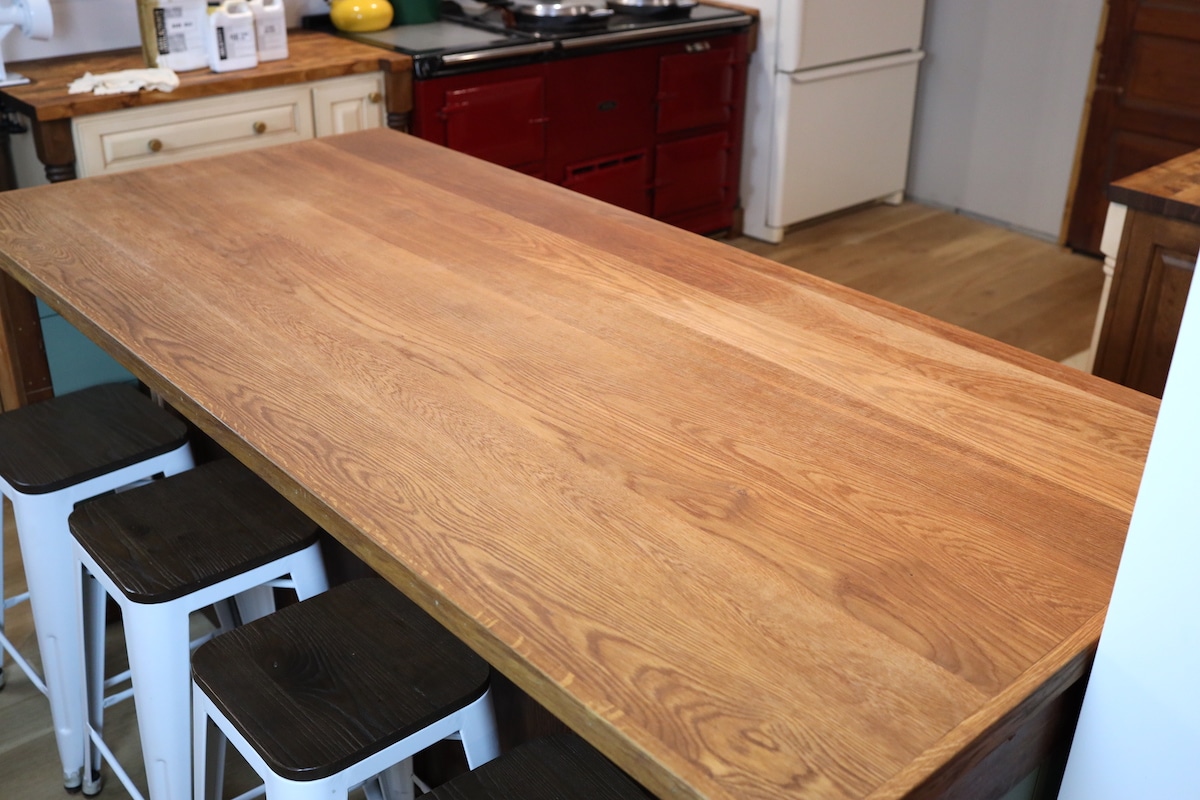
So you’ll need to decide when is the right time to refinish your countertops. It might be every 6 months. It might be every 6 years! But whatever you decide, the steps are simple and vey similar to the original finish process.
Step 1
First I went through and gave a light sanding with 100-150 grit sandpaper to any spots, ridges, scratches, or other flaws I found. Then wipe the surfaces clean with a moist rag.
Step 2
This time, mix at a 2:1 ratio of Citrus Solvent to Tung Oil then apply the same as above. This thinner ratio of Tung Oil allows for deeper penetration. I found another 2 or 3 coats did the trick.
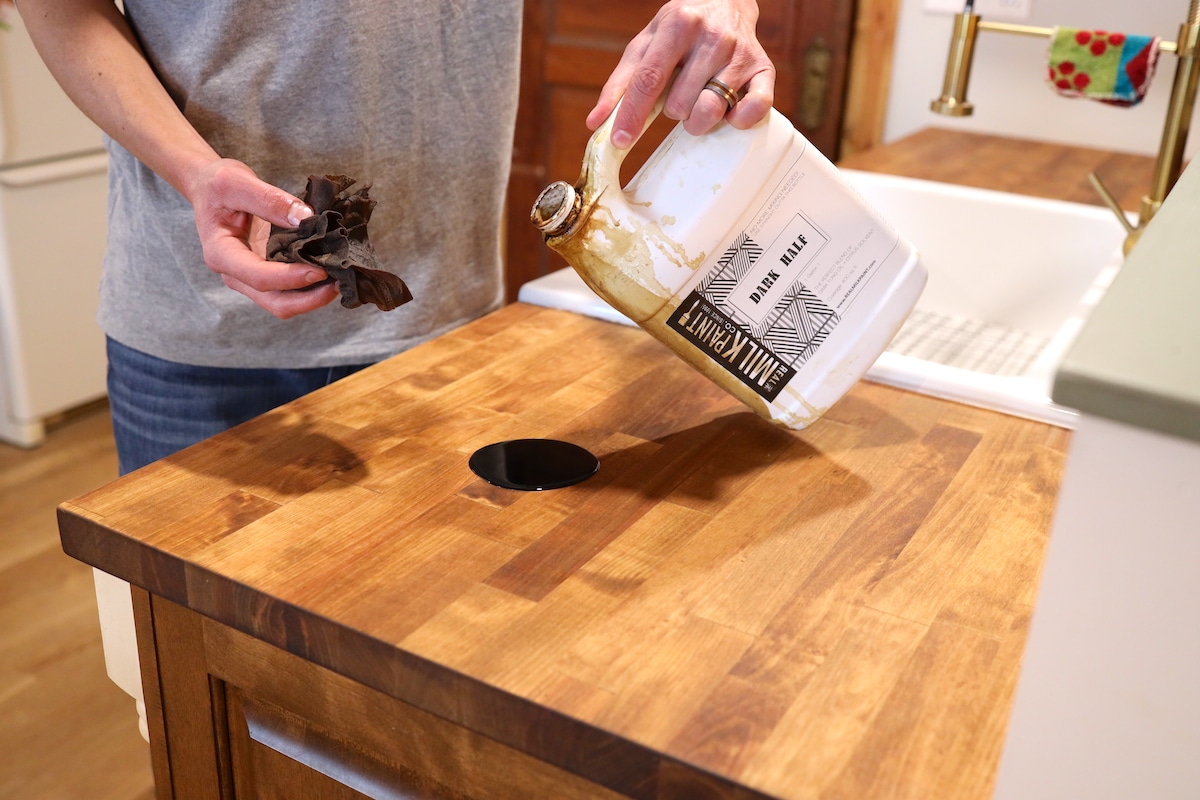
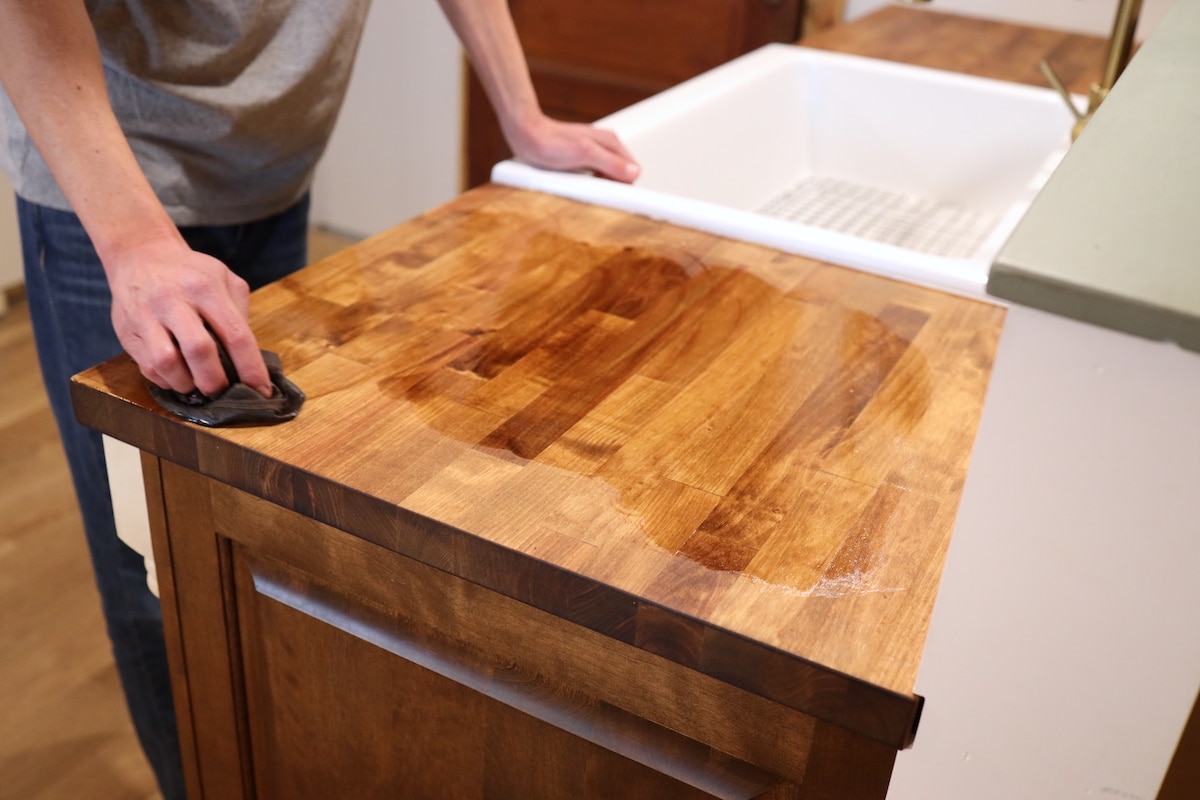
Step 3
Wipe away any excess and allow some time for curing before use.
What other uses does Tung Oil have?
Beyond countertops and cutting boards, we’ve found Tung Oil to be an incredibly helpful product to keep extra of around the house.
We used the same Dark Half from our butcher blocks to finish the trim we installed throughout our home.
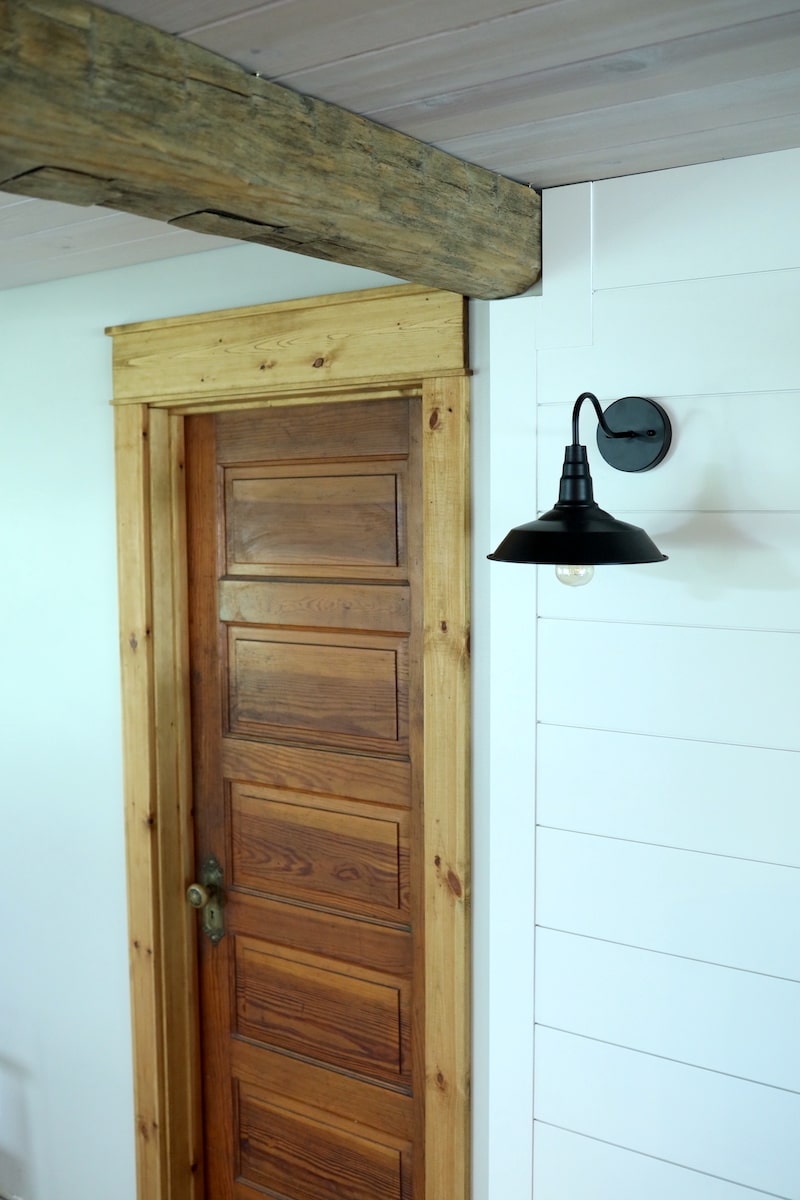
I’ve even used it to reseal wood-handled garden tools like hoes and rakes.
And while we didn’t use it for this, a common application is to use Tung Oil for wood floors. Non-toxic finish options for flooring are difficult to come by. We researched the gamete when checking out options for our white oak floors we installed. We ended up choosing to soap finish them, but Tung Oil was a close second, and still may be the finish we switch to in the future.
Indoor to outdoor use. Furniture making to spoon carving. Cutting boards to trim. Even concrete countertops! Tung Oil truly has a broad range of applications.
Where to buy Tung Oil?
We’ve had a really positive experience ordering directly through the RMP Finishes website.
And if you use the promo code – FROMSCRATCH – you can get an additional 10% off your order!
Other brands of Tung Oil exist, but Real Milk Paint Co. is the only brand we trust for 100% Pure Tung Oil without any added junk. We have promoted products from them for years and are happy to do so now as an affiliate earning a small commission from sales at no extra cost to you.
It’s worth also checking the Store Locator on the RMP Finishes website for retail locations! We were pleased to find that a local woodworking store in our area carries their products.
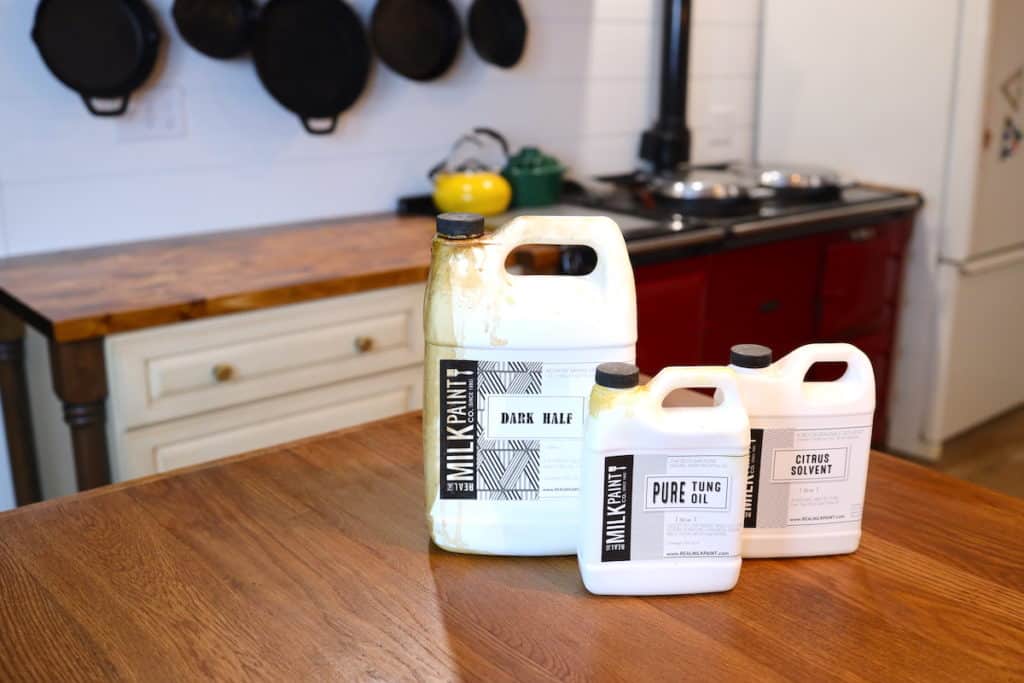
Check out more kitchen DIY projects:
- Simple Farmhouse Shelf for Cast Iron Storage
- How To Create Your Dream Kitchen Remodel On A budget | 5 DIY Ideas To Save Thousands
Pin it for later!


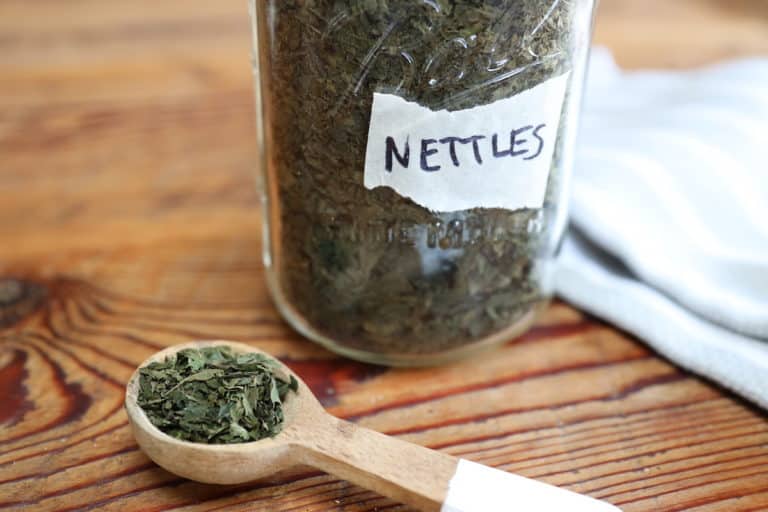

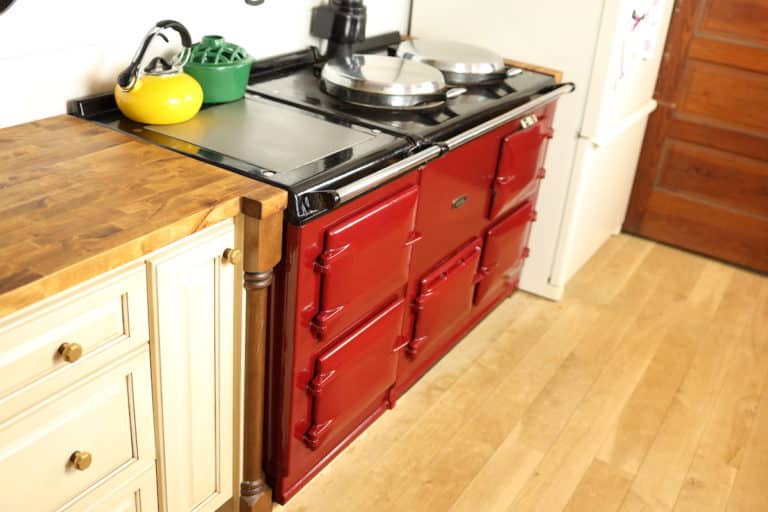

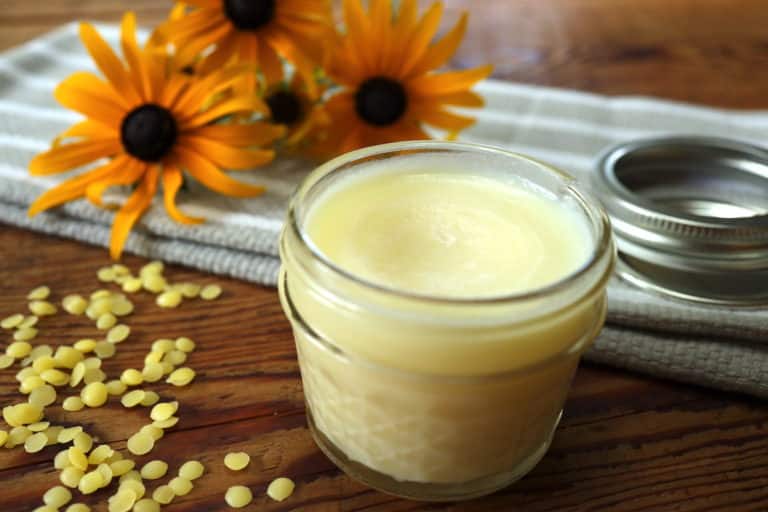

Thank you for your thorough review!
We’re looking for a different finish for our open wood shelves in our kitchen. We used a danish oil for our first “prototype” shelf and after months of use, we still have a chemical smell on our glasses (we store them upside down).
We are going to give this product a try! Fingers crossed!
Awesome, hope you love it as much as we do! The fresh citrus scent of the half n half should be a nice change. Thanks for stopping by and all the best!
I love your thorough review of this product, and all the info about tung oil in general. My question is about the solvent, as I have allergies to lemon and orange oils. Do you know of any other natural (not petroleum) solvents available?
That’s a really good question! I’m not super familiar with any other options. But I did a little searching and found this one that is soy-based and looks to be petroleum free. https://amzn.to/3kpR9et. You might also want to give Real Milk Paint Co. a call or email and see if they have a recommendation. Their customer support is excellent! They do make a high-grade, odorless mineral spirit also that would be a lot better than other options on the market. But I understand the desire to want to avoid petroleum altogether. Hope that helps and good luck!
Looks great. What wood is your countertop made from? I looked for it in the post, sorry if I missed it. We bought the birch butcher block from Home Depot to use on basement countertop surfaces and are debating how to finish. I’d like it a more medium brown such as yours.
Thanks! Ours are the birch tops from Menards so I imagine they should have a very similar look. Good luck with your project!
How long roughly did y’all wait before using? We are moving into our home at the same time of installing our butcher block with 2 toddlers so I don’t know if I can truly go longer than 10 days without using my counters but am really wanting to try this brand!
In all honestly we probably only waited a few days before using. My guess is, like most things that cure, that they do a high percentage of the curing in the first week or so and the remainder cures over the following weeks. I would recommend if you’re going to use them on the sooner side to try and avoid heavy wear and tear type things. Like avoid heavy pots, cast iron, dragging things across the counters, etc. We let them cure a few days, broke them in for a period with light use, and they’ve held up fine! Hope that helps and congrats on the move!
Your tutorial helped with so many questions that I had. I ended up buying a small kitchen island on FB marketplace and repainted it and did the butcher block top over. It is looking great and it is a pretty simple procedure to do. My question is this, on the back of my Tung oil container is says something about “spontaneous combustion”. I was going to keep my leftover half and half mix (I mixed the tung oil with citrus solvent) for when it needed another coat. Is this not safe to do? How do you store you product? I am afraid it will freeze if left outside in my shed (I’m in New England). I got so nervous and brought my brush and the glass container outside overnight. On a more positive note, I am thinking about using butcher block in my kitchen when I redo my countertops. Yours are beautiful!
Hey there! So glad this was helpful and I bet that island looks fantastic! That’s an interesting question… I wasn’t aware of any spontaneous combustion possibility. I wonder if that’s a blanket statement warning for oil based products? I just store it in the container it came in in our basement. It’s stored that way fine a few years without any issues. You can also reach out to Real Milk Paint Co. to see if they have any recommendations on storage. Good luck if you end up replacing your kitchen countertops!
Typically, with drying oil finishes (like tung and linseed) the combustion warning is for the rags used in applying and wiping down the finish. These rags, carelessly thrown into a heap, can catch fire, and, potentially, burn down the house or shop where they were left. It is vital to, at the least. to spread them out to dry. Even better is to stick them in to a pail of water, but I have always been okay with just spreading them out.
Great info. Thanks!
On your initial first treatments did you do multiple coats in one day with only 30 minutes between? Or did you do one coat a day for a few days and then let cure?
Hi! Yes, I did multiple coats in one day at first. The first day I did a few coats waiting maybe 30-60 minutes between each until it soaked in and started to dry. Then I let it sit overnight and did one or two follow up coats to make sure it was fully saturated. Then make sure to wipe up any excess good or the wet pockets might dry funny. You might need to even wipe it down with a dry rag once or twice in the day or two following. Hope that helps and all the best with your project!
Your review completely convinced me to try this product! We’ve had butcher block for almost two years and the mineral oil just doesn’t cut it. Can’t wait to try this! Thank you
Thanks for the comment – I hope you love it! It’s been such a game changer for us and has made having butcher block so much more pleasant!
Hello! I am so glad I came across this! I have been researching like a mad woman and there’s just so many different opinions on this. I love the natural product and coloration of the dark half. I have decided to order it for our kitchen remodel. I have one question, did you do any sanding between coats? I have worked with wood many times, but usually using stain and varnish/poly. I’ve always sanded between coats and many others say to do the same with butcher block. I want a nice smooth finish and am curious what you did. Thanks in advance!
Hey there! So glad it was helpful. I’m pretty sure I did do just a very light sand after the first coat to knock down any of the wood grain that stood up after getting wet from the oil. The thing with Tung Oil is you don’t want to sand it down too smooth, or the pores in the wood will become too small for the oil to penetrate optimally. I believe it’s 150 grit, but check with RMPCo and see what they recommend. Hope that helps and good luck with your project!
Hi, I am strongly considering using butcher block countertops with Real Milk Paint tung oil for the countertops in my new home, but I am skeptical of how well they will hold up. Do you use your countertops for big, messy projects like canning? I’m wondering if I can set a bunch of freshly processed jars on the counter without ruining it, and how difficult it will be to remove sticky spills.
Hi! So our kitchen gets heavy daily use and seasonal canning is something we do too. I’d say our countertops have held up really well to all of it. It can depend on the type of wood you are using how well they do, but our birch tops have been as close to waterproof as I can imagine for butcherblock tops. You’ll want to take the same precautions as you would with any countertop… lift metal pots and pans instead of dragging… we put hot pads under hot canning jar or other hot things to avoid burn marks, things like that. And while things don’t absorb immediately into the wood, if something is left too long it can eventually soak in. So any spills, standing water, or especially things that can stain like berries or beets we try to wipe up quickly. Hope that helps and good luck to you!
Did you finish your countertops before installing them? I have put two coats on the bottom. Installation won’t happen for a few more days, so I am thinking that I can go ahead and put a few coats on the top before they are installed.
Hey there! That sounds like a good idea. We did finish ours before installing, which I think is always easier to do and make sure you’re getting full coverage everywhere. We did finish ours before installing too. I may have put another coat or two on after they were installed just to make sure the oil had fully saturated the wood. And that’s great that you’ve coated the bottom too… that’s a step that’s easy to miss. Sounds like you’re on the right track! Thanks for stopping by!
Hi! I have just finished our butcher block counter tops in the half and half and I am now curious how you clean them after daily use?
Is there anything specific you use to clean and disinfect (if needed) your countertops?
Nice, hope you love them! I wouldn’t recommend anything too harsh. We use a cleaner called Branch Basics and just spray some on the countertops and wipe them clean with a wet rag. It’s mild yet effective.
Hello! What did you use to seal around your sink? We just finished using the Tung oil on our countertops thanks to your recommendation and we love them! Did you use a silicone caulk or something different?
Awesome, glad you’re loving your countertops! That’s a good question and I don’t know that I remember exactly what I used since it was a few years ago. Silicone is a really good option, maybe the best, around sinks and wet areas. The thing about silicone is that you typically can’t paint over it if that applies to your situation. Since I would have used the same caulk to seal around our sink as I used to seal our painted backsplash right behind the sink, I’m guessing I went with a siliconized caulk or other high quality kitchen/bath caulk that is paintable. Hope that makes sense! Good luck!
Thank you!
Hello. Here is another… “love your butcher block counters !!” We are designing a kitchen and plan on installing butcher block. I have had a small section of butcher block in several of my kitchens before and love working on it. Now I would like all of the counters in wood. My one question is…. how is your wood holding up next to the sink? That can be a lot of water on a daily basis vs occasional wet projects on a cutting board that gets cleaned up when your done.
Hey! Thank you! Around the sink was a big concern for me too, but ours has held up surprisingly well so far. A big key to that is getting a drop-in sink as opposed to an under-mount. We also made sure to get a fairly deep and large sink that helps keep water in the sink versus spilling over. We have the Sinkology Josephine fireclay from Home Depot. That said, water still spills over while doing dishes and whatnot. We try to wipe up any standing water around the sink whenever we’re done using it. I think that’s helped it hold up well over time. Plus, we made sure to caulk good between the sink and counter initially so water doesn’t get between them. Hope that helps and good luck!
Hi! I am about 20 days into carrying my butcher block, I think it has about four coats on it. I put a little bit of water on it to test and when I wiped the water away, the surface is rough. What did I do wrong? Does this happen with your countertops? Is it something where you just buff it out and then add a little oil until it is smooth when water gets on it? Do I have to wait another 30 days??
Hmm, that is interesting. Did it seem like the wood was fully saturated and wouldn’t accept any more tung oil after the 4 coats? What it sounds like is happening to me is the wood grains are raising when moisture is applied. That is typical of raw wood, which makes me wonder if it had enough oil applied to it. Often it’s recommended when prepping wood before applying a finish to wipe it down with a moist towel so those grains stand up and then do a light sanding to remove them. You’re pretty far along in the curing process so things should be mostly cured. I don’t know all the details of your countertops and how they were finished, so I’m not sure I have an official recommendation. If it were me, I might try wiping the whole top down with a moist towel and seeing if those grains stand up everywhere. If they do, I’m thinking it would be best to do a light sanding while they’re still raised and apply more coats of tung oil until fully saturated, and then let cure as long as you’re able before use. Just my two cents. You might also want to check with Real Milk Paint Co. to see if they have a recommendation. Good luck to you!
This post and the video I found before it helped answer most questions, but one remains. How much tung oil do I need to buy? My countertop will be 6 feet long and we’ll be doing a couple of 12″ x 6′ shelves to match.
Is one quart (32 oz) enough or too much?
Hey there! Honestly, if it were me, I’d probably consider getting the gallon. Chances are a quart would be enough, but I like having extra on hand for future recoatings and I like the freedom to apply the coats liberally and not feel like I’m trying to stretch it. If you take 6’x3′ for the countertop alone, double it to coat both top and bottom you get 36 sq. ft. for one coat. The Half n Half quart on the website says it does 100 sq. ft. There is also the reality that less oil spreads further with each coat since the wood can absorb less and less. Just my thoughts, but like I said a quart would probably do for your immediate needs. You can always reach out to Real Milk Paint Co. too and get their opinion. They’ll probably have the most dialed in insights. Hope it turns out great for you!